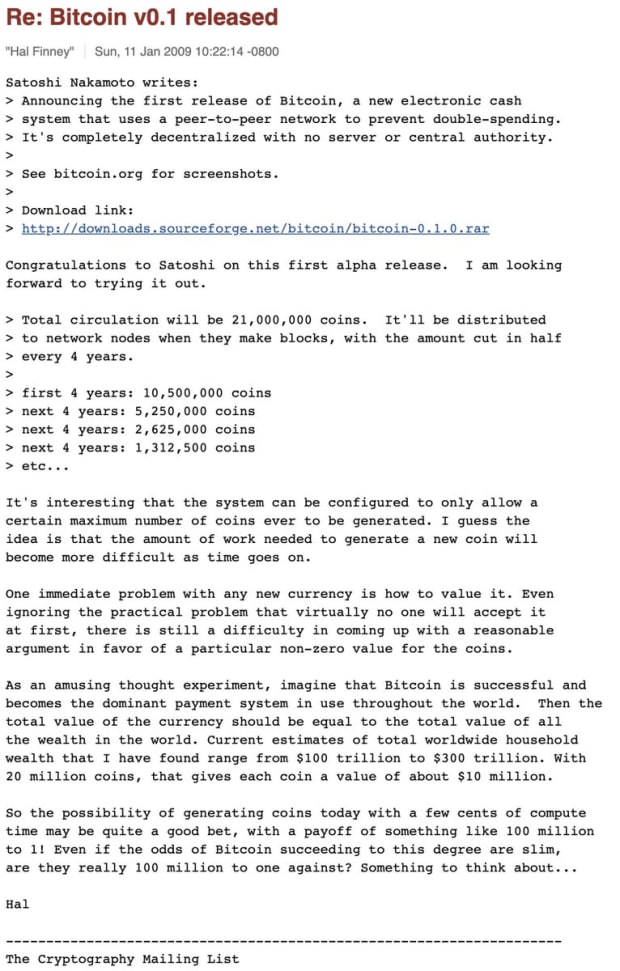The Hate Against Bitcoin Is Nothing New
New ideas have often found resistance, something that certainly isn’t new to bitcoin and its entrance into the mainstream.
“Nitimur in vetitum” (We are ever striving after what is forbidden)
You must have the devil in your body to suggest that there is something evil about a computer algorithm. Surely this would have to be counted as one of the fundamental characteristics of Bitcoin’s evolution: it has been called evil more times than the devil, there has been talk of banning it in hundreds of places, and it has thereby become much stronger and much more sought after. For more than ten years our good politicians have been organizing attacks against the same enemy, and the only thing they have achieved by doing so is that, through the habit of defending itself, Bitcoin has become more tenacious and fiercer, which is quite natural, because where we place evil, we express a relationship of fear, and therefore a weakness.
Many present goods are a past “considered evil” whose strength has overtaken us, and which we have therefore ended up legalizing despite ourselves. Many things we call good today is, rather, the conceptual transformation of what we once called evil, the subjugation of human laws to the force of the laws of nature, for which “good” means what is appropriate for the maximum development of life, and “evil” means everything that stops, restrains or forbids it. Hence it is rightly said that for a thing to be sought after it need only be forbidden, especially if its greatest attraction lies in the reasons for which it is forbidden, and if its harmfulness, judged from two very similar eyes, is something quite different.
If human laws were like those of nature, men would certainly not strive so hard to impose them; they would simply be accepted and obeyed conscientiously, and perhaps people would not quarrel with such vehemence as they do about evil and good things, to the point of annihilating mutually by making war on each other. In both barbarian and civilized times what has been demanded and imposed has failed, and, far from producing any benefit to man, has brought him nothing but endless harm. Why? Because its laws have not been made to help and educate him, but rather to intimidate him; because his best works have been censured rather than imitated and recommended! Because it was never enough for a man of genius to have a talent, but he also had to ask a government’s permission to have it; because it is thought that by persecuting and prohibiting one can achieve some kind of progress, when all that is achieved by it is the legal crushing of thought.
This, of course, is the ultimate degree of the stupidity of all governments: to want to oppress the very inventions that seek to correct their constant blunders; to insist on burning the great ideas of the human mind, even if the sparks have always been flying in their faces. An ancient Chinese philosopher said that when peoples were going down, they had many laws with the word “forbidden” in them, and he added that if we obeyed all that the laws forbade, we would have no time or age left to break them. He thus described what is the kind of inconsequential legislation, which believes that the war against evil is waged by forbidding everything to the people, without having to pay for it with the natural consequences that obviously come with forcing them to disobey it. The radicalism of our transgressions, of course, is a natural consequence of the radicalism of our prohibitions, which to preserve what they understand by “good name” would be capable of sacrificing what they wish to represent by that name. With laws, rather, we do exactly the same as we usually do with men: we do not choose the best, but prefer to deceive ourselves with their good or bad reputations, thus depriving ourselves of what their best shoots could offer us, if we did not decide to cut them off because they seem to us rough, thorny and unmanageable.
“Among quartzes the diamond is outlawed,” Fit Arari
“Persecutions,” says Voltaire, “are almost never of any use except to make proselytes.” It is true, and this is proved by what happened when the Catholic church forbade the reading of certain books, which while forbidden were eagerly read and sought after, to be only later forgotten forever by the freedom to obtain them. Then only the church could digest well the ill-gotten, just as in our century only a government can chew from a dish which the people have paid for, but of which they have hardly ever eaten. The dish, in this case, is that of the monetary system which, like the written and spoken word and language, was invented by the people, but in whose hands has long been out how and why to produce and legalize it. The legal “in itself” is a judgment reserved for the politician, who is accustomed to conferring value on goods and to forbid them, to bless men and to curse them, and to convince them that their economic and legislative system is as fair as it is democratic and equitable. Of all forms of government democracy is undoubtedly the one designed to inspire the greatest toleration, though hitherto our democrats have been the most intolerant of all people, for ignorant of the nature of the ends they question the lawfulness of the means, looking with the eyes of the executioner they judge of right and wrong, and speaking with the mouth of the people they squeeze them like the worst of tyrants.
“It is not right to correct wrongdoing by doing wrong,” Seneca, “On Anger,” I, 16
Bitcoin is proof that it is possible to speak very clearly and still have all the politicians in the world clamoring against it. It is as if it were reserved for those who want to do good to hear it spoken ill of, that what is in itself justifiable must strive twice or three times as hard to justify itself – even after it has been challenged on totally unjustifiable grounds – that just things must endure all kinds of slander, from those who deserve many and have never received any, and that they insist on throwing dirty water at them only to lose it when it mixes with their clear, deep waters. What harm has Bitcoin done them, apart, of course, from considering the world its homeland, mathematics its fortress, kin the righteous and strangers the scoundrels? Do they think that falsely accusing it will serve to defeat it, to condemn it and to bury it? It is true that in this world the slanderers are almost always right, if they are not hastily confused with a mathematical truth like that of Bitcoin, which first does what it was commissioned to do, and reserves its good or bad reputation for another time, and is therefore concerned to solve the problems of our monetary system as soon as possible, so that its slanderers can get on with the business of chasing bad men and bad algorithms?
“‘Tis a wonder that you are in the habit of feeding on darnel, with wheat at so low a price.’” Plautus, “Miles Gloriosus,” II, 3, 320
You will forgive me for saying so, but all of Bitcoin’s enemies are extremely primitive men, judging the novelty by its unknown effects. Even the wisest of them often act like those fools who do not consider that a digital good can have real intrinsic value, but readily admit that a piece of paper issued by a central bank does. Such a way of thinking recognises the vulgar man: what he cannot touch, what he does not understand, what he lacks at all, what he is not able to count, what he cannot weigh, what he cannot coin, lacks for him any kind of natural value. The truth is that one must understand very little of human development, through all the centuries, to think that designing a computer algorithm is as simple as printing a banknote that fits in one’s pocket; or to believe that, with respect to money and its intrinsic value, the how and the what are self-explanatory. About money, economics, wealth, right or wrong, everyone thinks he can talk, and therein lies perhaps the greatest sign of his intellectual vulgarity, the true explanation of why things are divided into those about which it is possible to have knowledge and those about which it is possible to have opinions, and why therein lies the sole power of the mediocre, who take poor reasons from here and there to put them together and turn them into objections. The mediocre misunderstands everything, and, moreover, always misunderstands something else, which does not prevent him, though he sits in the third row of reality, from believing that he occupies the first row in opinion. He has been taught to believe without reasons, so that it is impossible to expect him to question with reasons, and if his nonsense has any respectability it is only because it generally concerns respectable things. He seems a person who is destined to misunderstand, or not to think at all, or to persecute the few who understand and think in the world. The stimulus of knowledge is in his case minimal, since on the road to it, flat and without danger, he has never encountered a single abyss. But if the sparrowhawks have always done the same thing, why should we expect men to change? The mediocre will never have ears to listen to other people’s reasons, and the intelligent would rather cut out his own tongue than spoil it by trying to penetrate his head.
“We only discredit that which we do not recognise and understand,” Johann Wolfgang von Goethe, “Maxims and Reflections,” 1135
But be that as it may, the enterprise will be more praiseworthy if resistance rises around us, for sunny days are as necessary for grapes to ripen as rainy ones. This will not be the first time that the greed of two or three old men will openly oppose a great invention, nor the last time that mediocre people will display the prejudices that correspond to their talent. It is rare that habit and mediocrity do not oppose great enterprises, since they seldom agree with them, and rarer still that the old look favorably on the successes of the new. Our wretched species is so made that those who walked an old way always threw stones at those who taught a new one, to which we owe our historic fondness for spending four days in the week burning good men and the other three in pursuing their great inventions. It has been rightly said that old convictions are more dangerous enemies to truth than lies, especially to those men to whom truth alone is not enough, but who need some authority to teach and permit them. Leisure and bad governments have educated us to look askance at everything new, to such an extent that the proverb is constantly verified in us that it is easier for a man to change his hair than his old thoughts. But if history shows us anything, it is that one must be either very rich or very foolish to oppose the new without being ruined by it, especially when one knows the good and of one’s own free will turns away from it, when reason speaks to one’s ear, makes one see the best, and yet insists on the worst. The pretended prevention of the dangers of novelty is nothing but fear of the unusual, and of the possibility of discovering in it something better than what we call truth, for, if we were to accept at once and willingly the highly revolutionary voices, we should have to eliminate from our heads many ideas as wrong as they are popularly approved, whereas by rejecting them we can go on living without forcing ourselves to change anything at all in it.
“There are two ways of behaving towards merit: either to have some of one’s own, or to admit none in others,” Schopenhauer, “Parerga and Paralipomena II,” 20, 242
Perhaps there is nothing so mediocre as to reproach those who strive to live under a new truth, those who try to judge life according to science, and not according to ideas as misguided as they are old, and those who set out to cross impassable terrain with two or three capable friends and in the face of a hundred or two hundred million incapable enemies. Pulchrum est paucorum hominum (beauty is for the few), and for the few it has always been in bad taste to try to convince the many of anything, especially since most people would rather flee into the night and take refuge in the shadows than look at the sun in search of some bright idea. Besides, it is neither pleasant nor easy to help those who do not want to be helped, nor do they understand that a great part of healing lies in wanting to be healed. They do not venture to breathe in any other way than as the public voice commands, which finds something worthy of censure in everything that is new, always takes hold of the noble and never quarrels with the vile. If they only knew that there is no tree so firm and strong as the one on which a constant wind blows, which the very abuse forces it to sink its roots and hold on, they would understand that the great always finds a way to save itself, no matter how hard the small tries to bend it. So, we hope that they will continue to attack our mathematical protocol, that they will say the worst things about it, so that a tree that is becoming more and more firmly established on earth will continue to grow.
“Audentis fortuna iuvat” (“Fortune favors the bold”), Virgil, “Aeneid X,” 284
This is a guest post by Anderson Benavides Prado. Opinions expressed are entirely their own and do not necessarily reflect those of BTC Inc or Bitcoin Magazine.









